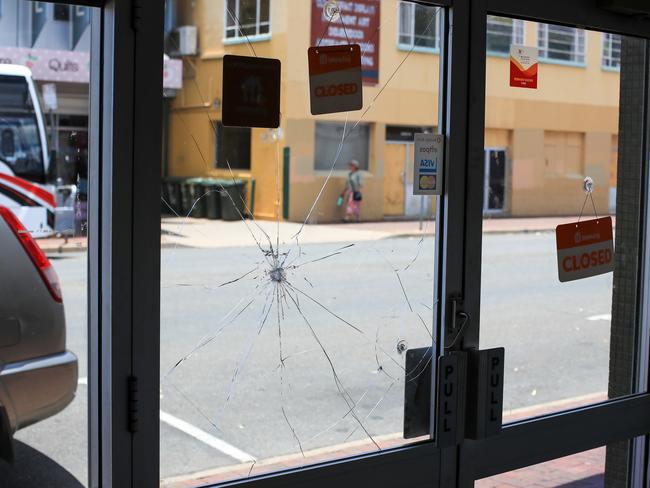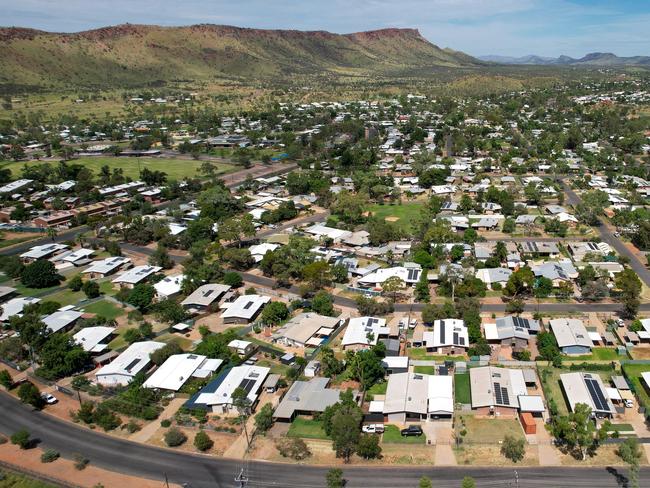Alice Springs alcohol-related assaults soared by 68 per cent in 2022
New figures have laid bare the shocking scale of the crime wave gripping the troubled outback town of Alice Springs.

National
Don't miss out on the headlines from National. Followed categories will be added to My News.
Alcohol-related assaults and domestic violence incidents increased by more than two thirds in 2022, according to disturbing new figures laying bare the scale of the crime wave gripping the troubled outback town.
Meanwhile, there were nearly 1800 home and business break-ins and more than 400 cars stolen, the latest figures from NT Police show.
The monthly crime statistics released on Friday include new data covering the month of December 2022, providing the final outcome for the calendar year compared with 2021.
Overall, alcohol-related assaults increased by a shocking 68 per cent, domestic violence-related assaults were up 66 per cent and assaults were up 51 per cent. Property damage rose 55 per cent, commercial break-ins by 47 per cent, motor vehicle thefts by 13 per cent and house break-ins by 9 per cent.

Sexual assaults were the only category that saw a decline, down 11 per cent in 2022.
Commander Danny Bacon told reporters domestic violence continued to be a top issue across the Territory.
“[Domestic violence] is the primary crime type that’s in our community today,” he said at a media conference, the NT News reported.
“Overnight we had 29 domestic violence incidents that our officers had to respond to in the greater Darwin area. In comparison we only had two unlawful entries.”
In the Alice Springs local government area, which has a population of just 28,000, there were a total of 2823 assaults recorded, 1886 domestic assaults, 1521 alcohol-related assaults and 79 sexual assaults in 2022.
There were 959 house break-ins, 834 commercial break-ins, 408 motor vehicle thefts and 3631 cases of property damage, the figures show.
Amid growing public outcry and heightened media attention on the Central Australian town, the Northern Territory government caved to pressure earlier this month, announcing a reintroduction of alcohol bans in Indigenous communities.
“We’ve heard loudly and clearly that the matter and decision of alcohol on community needs to be one that is made by the entire community,” NT Chief Minister Natasha Fyles announced last Monday.
“That is why we’re creating a circuit breaker and implementing temporary dry zones until communities can develop and vote on the alcohol management plans, the community alcohol plans, they want to see. It is important for all of us as Territorians to tackle this issue once and for all.”

At the same time, Prime Minister Anthony Albanese announced a new $250 million package to support youth engagement and diversion programs, job creation and improving health services.
“The truth is that all governments could have done better. All governments — Labor, Liberal, Northern Territory, here in Canberra, could have done better,” he told parliament.
“This is about intergenerational disadvantage. It is about a lack of employment services, a lack of community services, a lack of educational opportunity.”
The announcements came after Central Australian Regional Controller Dorrelle Anderson’s report was released publicly, calling for immediate restrictions for takeaway alcohol and extra federal funding.
Ms Anderson was appointed after Mr Albanese and Ms Fyles had crisis talks in Alice Springs last month.

“Although the NT has some of the most rigorous and world-leading supply measures in place, it is clear that additional work is required to act as a circuit breaker in Central Australia to allow service agencies, including police, child protection and health providers, the necessary time to engage with those affected and support them,” Ms Anderson wrote.
“A failure to seriously address the underlying drivers of alcohol misuse and youth crime will mean these harms will continue to return year after year.”
Opposition leader Peter Dutton said in response that alcohol was only part of the problem, and he wanted the nation’s focus to turn to the drug and sexual abuse issues.
“But we’ve got children who are being sexually abused and we’re putting them back into an environment where they’re not safe,” he told ABC Radio.
“And I don’t care what the circumstances, what culture we’re talking about, we can’t be putting anything above the interests of the child and the protection of those children.”
— with NCA NewsWire
Originally published as Alice Springs alcohol-related assaults soared by 68 per cent in 2022





